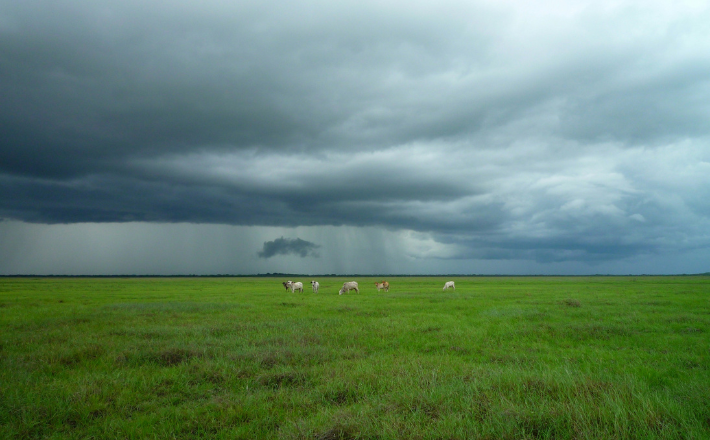Commentary on Jeremiah 23:23-29
In this complicated geopolitical world in which we live, it is difficult to know what is true, what is false, and whose truth prevails in the battle between competing points of view. It might be some consolation that these questions also plagued another community under duress thousands of years ago. At the heart of this week’s lectionary text is the question of who speaks for God and whose words are a fair representation of the divine word. Thus, how does one go about discerning between true and false prophets? Or, as God asks in Jeremiah 23:29, “What has straw in common with wheat?” Ultimately, the distinction between true and false prophecy is a matter of what is nutritious and, like wheat, can be prepared into the bread of life or, conversely, what has little to no nutritional value, like straw.
Jeremiah 23:23–29 forms part of a larger section on failed leadership (Jeremiah 22–23), in which the prophet offers a sharp rebuke of the unjust rulers and the false prophets who have led the people astray. Sandwiched between a refutation of the false prophets in Jeremiah 23:16–22 and Jeremiah 23:30–32, one finds in this week’s lectionary text a poignant meditation on God’s presence, narrated in the first person. In a series of rhetorical questions, God reveals Godself to be a God who is very near, “a God not far off.” God is a seeing, hearing, knowing God. As elsewhere in the Hebrew Bible (Genesis 3:8; Psalm 139; Jonah 2), it is evident in this text that one cannot hide from the God who finds the believer trying to stow away in secret places (verse 24).
Employing lament language (“How long” in verse 26), God shares God’s dismay about the false prophets who turned away from God and led the people astray. God is furious because the false prophets steal the name of God when they proclaim, “Thus says the LORD,” and then continue to share their own dreams: “I have dreamed, I have dreamed!” (verse 25; see also verses 30–31). These lying prophets pretend to convey the divine vision through their dreams but instead lead people astray, causing them to forget God’s name and no longer recognize God’s presence in their midst.
These dreams, moreover, as evident also in the previous pericope (verses 16–22), are rooted in the “good news” that all “shall be well with you,” that no calamity shall come upon you (verse 17), providing the people with a false sense of security that results in complacency. Echoing Jeremiah 6:4 and 8:11, these false prophets proclaim “peace, peace,” when there is no peace.
As in the epic showdown between Jeremiah and Hananiah in which the latter emerges as a false prophet who proclaims quick fixes and happy endings, God condemns these prophets who are deluding the people, who “speak visions of their own minds” (verse 16) and “deceit of their own heart” (verse 26). However, as God declares: “I did not send them or command them, so they do not profit this people at all” (verse 32).
In contrast to the delusional, empty dreams of the false prophets that are, sadly, all too effective, the true prophetic word that comes to the people through God’s true prophet, Jeremiah, is portrayed in terms of some striking metaphors that capture the power and efficacy of the divine word. In verse 29, God’s word is said to be like fire and “like a hammer that breaks a rock in pieces.” The multivalent meaning of fire suggests that God’s word can warm the hearts and minds of those near it. But fire can also be destructive, turning the straw of false prophecy into ashes.
This image of God’s word as fire is also found in Jeremiah 20:9, when the burden of being a prophet, particularly having to proclaim words of judgment, is associated with the image of the prophetic word as “a burning fire shut up in [his] bones.” Jeremiah exclaims, “I am weary with holding it in, and I cannot.” Being a true prophet is not easy, especially in difficult times that inevitably see the emergence of many false prophets.
The lectionary text acknowledges the burden of bearing witness to the gross failure of leadership in this community under duress, with all too many lying prophets who “use their own tongues and say, ‘Says the LORD” (see also the repeated reference to this heavy burden both to the prophet and to God in verses 33, 34, 36, 38). And yet, those who have fire in their bones are implored to speak God’s word faithfully, no matter how difficult it may be.
The question regarding God’s presence in these battles for truth, in which God’s name and presence are invoked by true and false prophets alike, is important for us to consider. The series of rhetorical questions God poses, about whether God is nearby or far off, continues to resound as we are left wondering whose words truly reflect the divine word and who is conjuring up lying visions.
On the one hand, one could say that it is good news that God does not hesitate to enter the fray and be present amid the messy politics dominating Jeremiah’s world, as evident in the sharp rebuke of the life-denying words and visions of the false prophets. But then again, the false prophets steal God’s name for their own lying dreams, causing great anguish both to God and to God’s true prophets, particularly because they are so effective.
Ultimately, the text leaves us with no conclusive yes or no regarding God’s immanence versus God’s transcendence. Jeremiah 23:23–29 asserts that God fills everything and is to be found in all spaces (see also God’s question, “Do I not fill heaven and earth?” in verse 23) and, at the same time, cannot be localized near or far. Perhaps this inability to pin down God’s presence and/or absence in the text and the world suggests that God cannot be controlled by either side of the prophetic duel for truth.


August 17, 2025